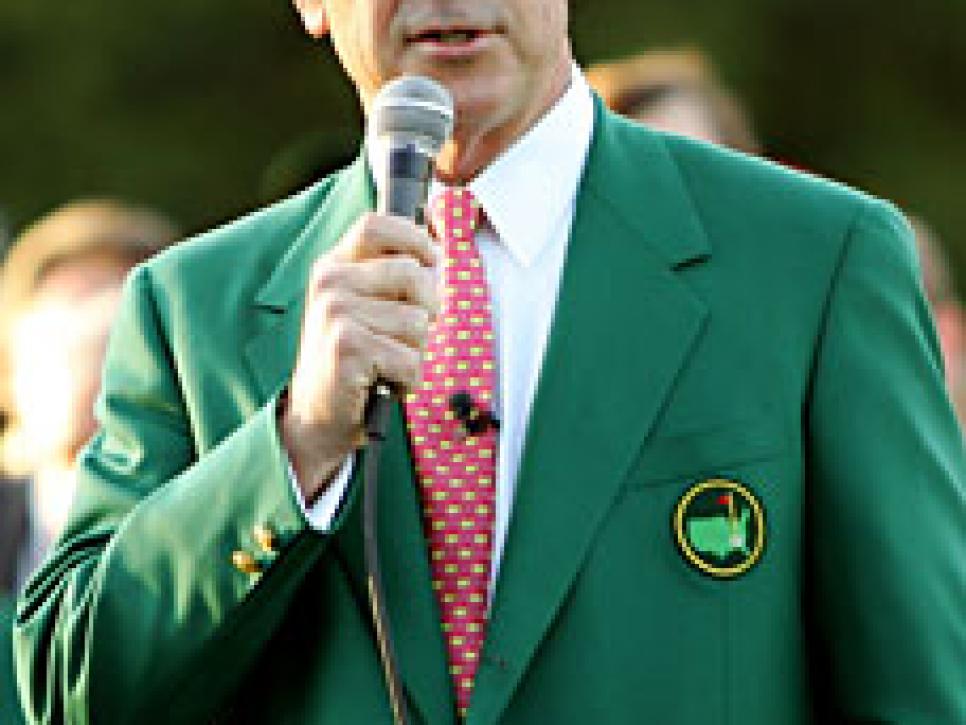News
Forecasting Drama

Augusta National chairman Billy Payne admits he is sensitive to the criticism the club has taken for changes to the golf course.
While players and spectators shivered in the cold Tuesday afternoon, a small group of green-jacketed Augusta National GC members were plotting favorable hole locations on the club's short course to make sure today's Par-3 Contest would be warm and fuzzy. They want wedge shots to do backward dances into the cup or scare it if they don't go in. The idea of "protecting par" in the Par 3 Contest is as alien as a grim-faced competitor on this feel-good afternoon.
The green jackets should keep this largesse in mind when they go about their prep work for the start of the main event. The Masters' mood swing the last few years is not just about what has happened on the back nine Sunday but the front nine Thursday. Combined with dramatic course changes and challenging weather, there also seems to have been a more concerted effort through course setup to separate the contenders from the pretenders the first two rounds.
Less choreographing early could mean more excitement late, because a tournament's character begins to form well before the television cameras come on in the fourth round. It will be interesting to see if Masters officials are more friendly in setting up the course for the first two days this year in an attempt to restore what people remember and enjoy about the Masters although championship committee chairman Fred Ridley denied there has been a hard-to-easy approach.
"There are some traditional pin placements for Sunday, for sure," Ridley said. "We try to balance that out [round to round]. It's not a science. Some days may play harder than others, but there is no preconceived notion in that regard."
It looks like the tournament is going to get a helping hand from Mother Nature. After a big chill for the first two practice days, it's getting warmer today and temperatures are suppose to moderate more as the week goes on. There are those who believe that in calm and warm conditions the "new Augusta" can produce the aggressive, exciting golf of yesteryear. Count Phil Mickelson among that group.
"The weather the last two years has made the course play much more difficult than previous years," Mickelson said. "And it's very hard to mount a charge when it's cold and windy. But I don't think that was due to the changes in the course. The forecast is for warm and sunny. In that the case, I don't want to say short, but it will play much shorter than we saw the last couple of years, and we will see some reasonably low scoring. When I played here a couple of weeks ago when it was warm -- 75 degrees -- I was able to hit the same clubs into the par 4s and par 5s that I did back in the early '90s."
That kind of anecdote is encouraging news to those who remember when the risk-reward scale at Augusta National tilted toward a payoff for bold, creative play. And it was in stark contrast to what was going on Tuesday in the gusts. Ernie Els, for instance, told Golf Channel he had hit a 3-wood approach to the par-4 first hole, and the Augusta Chronicle reported that only one player reached the yawning fairway bunker at No. 1 with his drive and no one cleared it.
An improving forecast was also good news to Masters chairman Billy Payne, who hopes better weather will do the trick to restore excitement. "I think we have it about right," Payne said of the course. "I would be quick to add that this week is an important test. Since the most recent substantial changes to the course in 2006, we have not had good weather over the weekend. The players have not in fact had the opportunity to demonstrate their skills against the competitive test of the course. I think we're going to see some good scores shot this week and see the course play as it was designed to be played when those changes were made. I think we're going to be pleased with the result."
Payne admitted to being stung by reading many critical reviews of the revamped course. "You go to a piano recital of one of your granddaughters and somebody says that's the worst kid I've ever seen, it hurts your feelings," Payne said. "The [critics] are entitled to their opinion, but I hope as a consequence of good weather and further thinking about the course and the strategic approach to the course through time will eliminate most of that criticism."
In running through the tweaks to the revamped course, Payne noted the new tees at the first and seventh holes that can allow those par 4s to play a bit shorter. He also talked about the widening of the 15th fairway on the right side to give players a bit more room that was taken away when a grove of trees was put in. It's a change, he hopes, will have more golfers going for the par 5 in two.
Payne talked about how actively the Masters has solicited opinions from patrons and taken them to heart, from concession-stand choices to a smoking ban in seating areas. "We listened, and we took action."
If, as early as Thursday, the scores are down and the decibel level is up, we'll have a good idea whether or not this will be a retro Masters so many are hoping for.